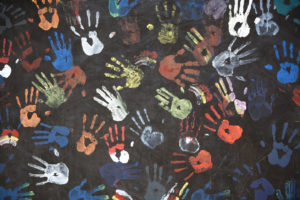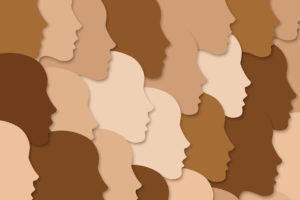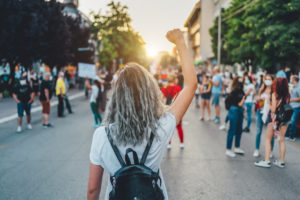Discrimination on the basis of race is a fundamental human rights issue. The UN Universal Declaration of Human Rights (UDHR) proclaims that all human beings are born free and equal in dignity and rights, and that everyone is entitled to all the rights and freedoms set out therein, without distinction of any kind, in particular as to race, color, or national origin. The preamble to the International Convention on the Elimination of All Forms of Racial Discrimination (ICERD), adopted by the UN General Assembly in 1965 and entered into force in 1969, includes a reaffirmation that discrimination among human beings on the grounds of race, color, or ethnic origin is capable of disturbing peace and security among peoples, and the harmony of persons living side by side even within one and the same state. Article 5 of the ICERD calls on states to undertake to prohibit and to eliminate racial discrimination in all its forms within their borders and to guarantee the right of everyone—without distinction as to race, color, or national or ethnic origin—to equality before the law and enjoyment of an expansive portfolio of rights, including, among other things, the right to equal treatment before the tribunals administering justice as well as political rights, in particular rights to participate in elections and equal access to public service. Article 5 also obligates states to protect economic, social, and cultural rights, including the rights to work, to free choice of employment, to just and favorable conditions of work, to protection against unemployment, to equal pay for equal work, and to just and favorable remuneration.
International human rights standards were originally written by states to create a framework and set of goals for governmental action, and it was often argued that such standards did not apply to the private sector. For many, the obligations of businesses with respect to the subjects covered by international human rights standards were limited to compliance with applicable national laws, even if those laws failed to meet international standards. However, as time has gone by, ideas have changed, albeit slowly, and there is now growing support for the notion that although the primary duty to protect human rights remains with national governments, businesses also have responsibilities to respect human rights in their operations. The preamble to the UDHR imposes duties to promote and respect human rights “on every individual and every organ of society.” In 2011, the UN Human Rights Council endorsed the Guiding Principles on Business and Human Rights, and Guiding Principle 11 provides: “Business enterprises should respect human rights. This means that they should avoid infringing on the human rights of others and should address adverse human rights impacts with which they are involved.” Importantly, the official commentary to the Guiding Principles endorsed by the UN Human Rights Council makes the following clear: “The responsibility to respect human rights is a global standard of expected conduct for all business enterprises wherever they operate . . . . [It] exists over and above compliance with national laws and regulations protecting human rights.” Businesses have also been called upon to contribute to the Sustainable Development Goals established by the UN, such as access to basic services, participation in decision making, full and productive employment/decent work, reducing income inequality, ensuring equal opportunity, promoting peaceful and inclusive societies, providing justice for all, and building effective, accountable, and inclusive institutions at all levels.
Unfortunately, despite all of the proclamations described above, as well as specific laws such as the federal Civil Rights Act of 1964, the United States and other states have failed to fully implement the ICERD, and racism remains one of the paramount human rights problems and threatens the livelihood and rights of millions of people in the United States and around the world.[1] In her book, Caste: The Origins of Our Discontents, Pulitzer-Prize-winning author Isabel Wilkerson wrote: “Our founding ideals promise liberty and equality for all. Our reality is an enduring racial hierarchy that has persisted for centuries.” She goes on to argue that racism in America is the byproduct of an unseen skeleton: a caste system that for centuries, even after the formal ending of slavery, has placed African Americans at the bottom rank in a societal hierarchy and repeatedly denies them respect, status, honor, attention, privileges, resources, benefit of the doubt, and basic human kindness. For her, the only way to fix the broken American house is to “tear out the plaster, down to the beams, inspect and rebuild the rotting lath” and “recast and reconstruct.”[2]
As is well known by now, the death of George Floyd, a black man, while he was in the custody of the Minneapolis police department on May 25, 2020, set off days of large public demonstrations against racial injustice all around the world, often accompanied by vandalism and looting as well as disproportionate police responses that escalated the tensions. As has often happened in the past when such incidents have occurred, businesses large and small were quick to issue statements through social media expressing their concerns about social justice and supporting the Black Lives Matter movement. Many large and well-known brands made commitments to contribute substantial sums to social justice initiatives and to support minority businesses. However, a law professor who studies economic justice at Emory University complained in The New York Times that: “Most of these corporate statements were put together by the marketing team that was trying not to offend white customers and white employees . . . . It’s complete B.S. It’s performative.”[3]
Others argued that the responses of a number of companies were “hypocritical” and “too little too late,” and pointed to examples of expressions of support for racial justice by large technology companies that appeared to be at odds with prior practices:
- Facebook being criticized for discrimination against black employees and lack of diversity in the workforce;
- Amazon calling for an end to “inequitable” treatment of black people, but long being criticized for low pay, poor working conditions, ignoring the complaints of workers (particularly during the course of the COVID-19 pandemic), and providing software to law enforcement agencies that has been misused in the racial profiling of black people (Amazon later announced that it would terminate its contracts with the police); and
- Google significantly rolling back its diversity and inclusion initiatives to avoid being perceived as anti-conservative.
Floyd’s death, which was quickly followed by the senseless killing of another black man, Rayshard Brooks, by a white police officer, was part of a seemingly endless series of high-profile violent events targeting African Americans (e.g., Ahmaud Arbery, Breonna Taylor, Eric Garner, Trayvon Martin, and others), and occurred during a health pandemic that has been difficult for every American, although there is evidence that the adverse impacts have fallen disproportionately on blacks and other people of color. For example, local government officials reported that job losses in New York City relating to the economic carnage of the pandemic have been much more dramatic among people of color—about one in four of the city’s Asian, Black, and Hispanic workers were unemployed in June 2020, compared with about one in nine white workers.[4] In answer to the longing among large swathes of the country to simply return to “normalcy,” i.e., the ways things were before the health crisis began, protestors and their supporters are signaling that the exclusion and disparity of the past will not be good enough and that the country and its businesses must brace and commit themselves to what will be a difficult but necessary path toward a “new normal” grounded in economic justice. In fact, the president of the American Psychological Association argued:
We are living in a racism pandemic, which is taking a heavy psychological toll on our African American citizens. The health consequences are dire. Racism is associated with a host of psychological consequences, including depression, anxiety and other serious, sometimes debilitating conditions, including post-traumatic stress disorder and substance use disorders. Moreover, the stress caused by racism can contribute to the development of cardiovascular and other physical diseases.
Related to all this is the reality that almost all of the wealth generated in the stock market during the technology boom that played out in the years before the pandemic flowed to white families, with The New York Times reporting that Federal Reserve data confirms that typical black households had only one-tenth the wealth of typical white households. The evidence is clear that the black community has realized little in the way of tangible benefits from pledges of equity from Corporate America, and that it is time for businesses to finally make a meaningful impact in an environment in which fewer than half of black adults in America have a job (due in part to the devastation to the job market caused by the pandemic), and those black workers that do have jobs make less money than white workers (due to the limited types of jobs usually available to blacks, i.e., low paying service jobs, and the failure of businesses to pay black workers the same amount as white workers for the same work). Exacerbating the crisis is the prediction that 40 percent of black-owned businesses are not expected to survive the pandemic, due mostly to the lack of business credit and personal savings that possibly could keep them afloat until conditions improve.
Darren Walker, president of the Ford Foundation, criticized the traditional and predictable response of companies in the face of racism in an article in The New York Times, saying: “The playbook is: Issue a statement, get a group of African-American leaders on a conference call, apologize and have your corporate foundation make a contribution to the N.A.A.C.P. and the Urban League. . . . That’s not going to work in this crisis.”[5] The same article led with the headline “Corporate America Has Failed Black America” and went on to read: “many of the same companies expressing solidarity have contributed to systemic inequality, targeted the black community with unhealthy products and services, and failed to hire, promote and fairly compensate black men and women.”[6] Writing in the Harvard Business Review, Mark R. Kramer noted that although taking a public position on social media supporting racial justice is laudable, and arguably overdue in many cases, he hopes that the tragedy in Minneapolis leads to actions rather than just words from businesses. According to Kramer, surveys indicate that most Americans want businesses to respond to the unrest by purging racism from the workplace, committing resources to help communities recover from the unrest, and establishing the social, economic, and political conditions necessary for a just society, and he argued that businesses have a duty to act:
We cannot pretend that most major corporations in America—and their shareholders—have not benefited from the structural racism, intentional inequality, and indifference to suffering that is behind the current protests. Corporate America and the Business Roundtable have an obligation to go beyond tweets and quotes by committing to an agenda that will advance racial equity in meaningful ways.
Although there has been sweeping and heated dialogue on the root causes of the economic and social problems confronting people of color and the consequences to society in general, many recall that they have heard a lot of this before, such as during the 1992 protests triggered by the acquittal of four white police officers who brutally beat Rodney King in Los Angeles, and worry that the compassion, anger, and energy will eventually drift away. Meaningful change takes a long time to occur in elected bodies and local police departments, particularly during a time when the country is so divided politically. However, businesses have opportunities to act quickly if they can remain focused on creating and executing solutions within their organizations and business relationships. Although the principal victims of systemic racism are people of color, it is a problem for everyone to the extent that it erodes the fabric of society. Moreover, as one observer in The New York Times noted: “racial injustice and discrimination are forces that corrupt the corporate mission and core values of a corporation.”[7]
Frustrated people in pain are tired of waiting for politicians to act and are looking to the businesses that provide them with jobs, goods, and services to take a leading role in creating a more just society. In the past, businesses have been reluctant to get involved, and the argument was frequently made that market forces would eventually solve race problems facing American companies; however, in an article published in The Economist, Walker dismissed this notion and called such views “naïve and in denial about the hold of racism on our culture, including our business culture.” In the same article, a consultant argued: “It’s utterly unrealistic for anybody to bi-furcate a societal problem . . . it’s also a business issue because business exists in society, with employers, customers, suppliers and stakeholders.”
Business leaders must seize the challenges and opportunities that have gripped society’s attention in the wake of the events of the first half of 2020 by taking a stand and making and fulfilling commitments to action across a broad spectrum of issues and contexts, including embedding equality, diversity, and inclusion in the boardroom, the workforce, and all aspects of organizational culture; achieving financial equity and security; bolstering community engagement; getting involved in the public square through advocacy for racial justice, and reimaging products and services.
Over the next few weeks, we’ll take a deeper look into many of these issues and discuss some of the practical steps that businesses can take to contribute to racial justice and equality and what you, as a business counselor, can do to assist them when they are your clients.
[1] A. Bradley, Human Rights Racism, 32 Harvard Human Rights J. 1 (Spring 2019).
[2] I. Wilkerson, America’s Enduring Caste System, N.Y. Times Mag., July 5, 2020, at 26, 33, 53.
[3] D. Gelles, Corporate America Has Failed Black America, N.Y. Times, June 7, 2020, at BU1.
[4] P. McGeehan, Calamity Looms in New York City Over Job Losses, N.Y. Times, July 7, 2020, at A1, A7.
[5] D. Gelles, supra note 3, at BU1.
[6] Id.
[7] Id.
[8] The great awakening?, Economist, June 13, 2020, at 49.













